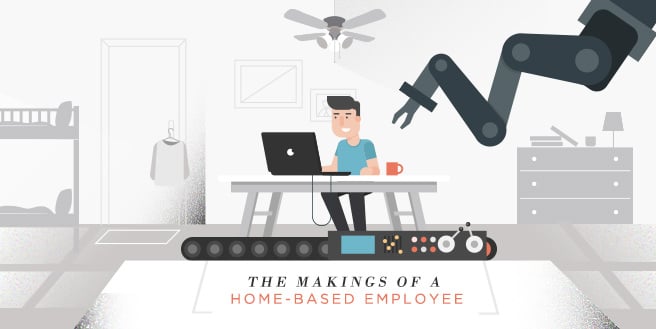The Makings of a Successful Home-Based Employee
Once upon a certain time, almost all of us, dreamed of getting rid of that 9-to-5 office job in exchange for the opportunity to work from the comfort of our own homes. Though we enjoyed going to work, the daily commute has been admittedly taxing for most of us and if given the chance, we’d all jump the opportunity of avoiding the early wake up calls, traffic jams and occasional work politics.
It’s true that being a home-based employee – or at the very least, having the flexibility to switch from your office to your couch once a week – could easily be one of the greatest decisions one could make in their career life but it’s not just the clear majority of today’s workforce who thinks so.
Flexing Time
According to an extensive study conducted by Flexjobs and Global Workplace Analytics, the amount of professionals telecommuting has significantly increased between 2005 and 2015. All the while the number of Americans who work from their respective homes at least half of the time, grew from 1.5 million during the year 2005 to over nine million employees or 2.9% of their overall workforce in 2015
FlexJobs CEO Sara Sutton Fell says that though more companies are now allowing its teams to opt for the said work arrangement, larger enterprises are the mo st likely to offer it that SMBs. She also adds that it’s high time employers pay attention to the trend.
Further strengthening the argument that working from home can be beneficial for both parties, the report also mentions advantages businesses can get from opening themselves to it.
Survey respondents say that other than that of the real estate savings they have from full-time remote workers, another ten percent can be cut from those who would be willing to accept the opportunity to have flexible hours or home-based working schedules. Some would even go as far as forgoing health benefits or putting in more time, lessening their overheard costs.
A significant increase in productivity has also been observed in telecommuters and several other studies have supported these claims. In addition, 82 percent of the participants said that they would be more loyal to their employers if they are given the said option.
It’s not much of a surprise anymore that telecommuting is becoming more and more popular despite of it remaining to be a crucial decision that needs to be negotiated between employee and employer. Yet of course, its rise to fame came with critics revealing the harsh reality covered by its promising nature.
Veterans of the working arrangement have said it countless of times, it’s not a piece of cake. It has proven itself to countless professionals as something much more challenging than imagined.
So before jumping to the bandwagon, here are certain qualities one must possess to successfully work from their home.
Qualities of a Home-Based Employees
Both the environment present in a traditional office and someone’s home are different from one another – each one carrying a unique sort of distraction absent to the other. And if you are not used to dealing with the interruptions working from home brings, you are sure to have quite the hard time being productive.
For example, the times you would visit the pantry in your workplace would be limited between two and three – once in the morning, once during lunch and one in the afternoon – but at home, the temptation of going to your fridge every hour is strong. Another is that it becomes much harder for us to stay away from our social media accounts unlike when we’re sitting in front of our stations.
Laser focus is needed to ensure that you stay on top of things when you are working home-based. Viewing your home office as the center of an actual one could help transitioning your mindset to professional mode.
Another quality worth nothing is the ability to embrace solitude.
Telecommuting isolates you and occupies you long enough that you go through one whole day without seeing or talking to anyone. And even if you live with a friend or your family, chances are, you shut yourself away for long stretches of hours.
It is one of the most disadvantageous reality of working in your own home. It lessens your opportunity to interact with fellow colleagues – resulting to overwhelming feelings of loneliness in the long term.
Try reaching out to your coworkers via Skype or emails and when allowed, talk on the phone and discuss important matters regarding ongoing projects. The beauty of this is that you have the chance to create a balance between sequestration and companionship.
Lastly, one should be able to keep themselves motivated throughout the day. Each skill requires the willingness to success. How can you stay focused when you’re barely in the mood to get out of bed? And how can you feel less lonely when you’re not making the effort of keeping yourself occupied with the tasks you need to accomplish.
Surely, telecommuting is not as easy as it seems, but if you’re still aiming for a much more versatile way of working then maybe you could give coworking a try. The well-known movement prides itself in curating shared offices for those who want to work in an environment that is unique from the one they have in their original workplace. Mainly targeting home-based teams and freelancers, it gives them the freedom to work whenever and wherever they want – minus the isolation and the laxed ambiance that results to a less motivated professional.
It takes a lot to exercise control when handed a large amount of freedom. Hence, before making the move towards working independently, make sure that you have what it takes to success in being a home-based employee.













Leave a Reply
Want to join the discussion?Feel free to contribute!